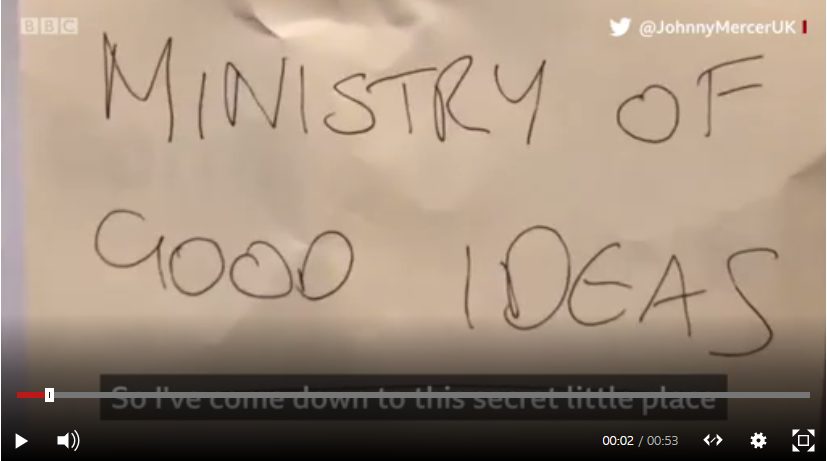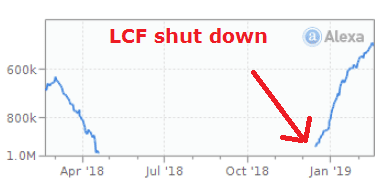Smith & Williamson have released their initial proposals as administrators of London Capital and Finance.
Their report confirms that London Capital & Finance was a Ponzi scheme.
Back in February S&W calculated that to return capital and interest to bondholders in full after paying out up to 25% commission, LCF needed returns of *at least* 19% per year.
Accordingly, in order for LCF to be able to repay the Bondholders, the Borrowers would need to make very substantial returns on the monies loaned from LCF to them. For instance, in the case of a… 5 year bond, we estimate that the associated Borrowers would need to repay LCF c.195% of the amount loaned to them over the 5 year period, requiring them to make a c.19% annual return on the monies loaned to them.
S&W’s latest report says:
The borrowers were charged 2% for the initial borrowing (and on subsequent lending) an annual interest of 1.75% was applied on a quarterly basis to their loan accounts. They were also charged, on top of these amounts, the rate of interest due to the Bondholders.
Bondholders were paid different rates of interest depending on when they invested and for how long, so it is not 100% clear what exact rate of interest was being charged. However, based on all the loans issued by LCF, the maximum rate that could have been paid by the underlying loans is 10.7% per year plus 2% at outset.
This means that even if all LCF’s underlying loans paid on time and in full (which they didn’t), LCF would never have had sufficient funds to repay investors from this source. (And this is without any allowance for bad debts or for LCF’s running costs.)
Some of LCF’s loans – specifically to Independent Oil and Gas and Atlantic Petroleum – are convertible to equity. In theory these loans could have returned more than the loan coupon if these conversion rights had been exercised, and the shares sold. There is no suggestion in the adminstrators’ report that any returns paid to investors came from converting LCF’s loans into equity or that this was ever a realistic possibility. Investing in equity was also never part of LCF’s business plan; the required rate of return was always supposed to be paid via secured loans.
As returns from its lending business were woefully inadequate to meet its liabilities, the only other way LCF could have maintained payments of interest and capital to investors was using new investors’ money.
Regardless of what proportion of repayments to investors came from the inadequate interest paid by the underlying borrowers, relying on new investors’ money to pay back existing investors made LCF a Ponzi scheme.
Other lies told by LCF
In an update posted on its website on 27 December, a day before the FCA froze LCF’s bank accounts, LCF claimed
For the avoidance of any doubt, LCF would wish to stress that at the date of this notice no borrower has defaulted on loans made to it and the security taken in respect of each borrower loan remains in place.
This, we now know, was a lie. In reality, according to S&W,
All borrowers had ceased paying the interest applicable to their loans by September 2018 which was 3 months before the FCA intervened into the Company in December 2018.
Failing to pay interest applicable is a default.
The list of assets
LCF has loans outstanding from a total of 12 borrowers, which Smith & Williamson has grouped into four controlling entities:
- London Group LLP – £154.6 million owed
- Prime Resort Development Limited – £70.1 million
- FS Equestrian Services Limited – £12.3 million
- London Financial Group – £0.8 million
London Group LLP
London Group LLP is an LLP controlled by Simon Hume-Kendall (ex LCF director) and Elten Barker.
The largest loan under London Group LLP is the £122m lent to London Oil & Gas.
This includes the £38.6m lent to Independent Oil & Gas. On Monday we noted that RockRose Energy had offered to buy this debt for £40 million, subject to S&W disclosing how big a share of the company this would give them via conversion rights, but their offer had been ignored by S&W, to the point that RockRose threatened legal action.
The administrators note the offer to buy the debt in yesterday’s report but do not offer any explanation as to why they have ignored it. They say that they are also seeking “to establish the value of the convertible loans mentioned and the share warrants they hold in IOG”, which is fair enough. But a quick email or call to RockRose to say “we don’t know how much these loans and warrants are worth either, so give us a minute” would not go amiss when someone is offering to bail out the creditors and allow you to cash in the only asset you are currently fully confident of getting money out of.
London Group’s other assets consist of:
a loan to Atlantic Petroleum, a Danish / Norwegian listed oil and gas company, which the administrators consider to have high prospects for return.
a series of speculative technology investments. One, London Artificial Intelligence Limited, apparently makes software that predicts future commodity prices. “While still in its infancy”, the software supposedly has a prediction accuracy of 85% for the one commodity it is able to track so far. The administrators believe “that this business currently has limited value but has the potential to have great value”. If the administrators can really extract great value from a magic piece of software that makes free money by predicting future commodity prices with 85% accuracy, then good for them.
London Power & Technology, a corporate vehicle used by London Group LLP to buy London Oil & Gas. This shell owes LOG £16.6 million. The administrators see no commercial benefit for LCF in this loan.
LPE Support Limited, which owes LCF £18m used to facilitate the sale of property companies making up the Prime Resort Development Limited loan group (see below). The administrators “have not established with sufficient certainty the purpose of this loan, where the funds went, the nature or value of the security provided or the mechanism as to how the loan will be repaid; these matters are under continued, urgent investigation”.
Cape Verde Support Limited and CV Resorts Limited, which relate to a partly built resort in Cape Verde. The administrators “are highly suspicious of this transaction and currently can see no evidence that any of the c.£12m owed to LCF will be returned or recovered”.
Prime Resort Development Limited
LCF is owed money by six companies under this umbrella, which consist of three leisure investments: two in the sunny Dominican Republic and one in occasionally sunny Cornwall.
The management of the Dominican resorts is being “totally unhelpful” in S&W’s attempts to establish the value of these loans and LCF’s security.
In regard to the Cornwall development, the administrators do not yet have up-to-date information on Waterside’s financials, and have concerns of whether Waterside’s value is sufficient to satisfy the loan-to-value covenant under the security agreement.
The section on the Dominican Republic and Cornwall investment contains one of the most serious statements in the administrators’ report.
Our investigations indicate that some of LCF’s Bondholders’ monies flowed through a variety of transactions, including with regard to deferred consideration, relating to the Waterside and Dominican Republic property companies (see references to WSL, CSL and CSL2 above), which resulted in multi million pounds of those monies going into thepersonal possession or control of:
Simon Hume-Kendall
Elten Barker
Andy Thomson
and Spencer Golding related trusts or interests.
The administrators have approached all four parties asking them to pay these monies into escrow for the benefit of the LCF Bondholders, to be returned to the four parties in the event that the LCF Bondholders receive full repayment from the assets of LCF. Simon Hume-Kendall and Andy Thomson have agreed to this arrangement and legal documents are currently being drawn up. Spencer Golding and Elten Barker have been asked to enter into similar arrangements and the administrators await hearing from them in this regard. This area is a key focus for the administrators’ activities at present.
Whether Hume-Kendall and Thomson still have the money to comply with these agreements is not yet known.
Hume-Kendall and Thomson have already been named as two of the four people arrested by the Serious Fraud Office on 4 March, and subsequently released without charge.
FS Equestrian Services Limited
LCF initially loaned Spencer Golding £10,439,062, which then became a £20 million loan facility to a new company, FE Equestrian Services Limited, to which Golding’s loan is believed to have been transferred (although the administrators are taking advice on whether Golding can still be held personally liable).
The loan was secured over all the assets of FSE. According to a stock listing submitted to LCF in July 2018, FSE owned 85 horses valued at £15 million. However, when S&W went to the stables, they were given a stock list of only 50 horses, of which only 35 were in their stable, with 11 of the rest being held by a third party for sale and the other 4 out of the country competing on the showjumping “Sunshine Tour”.
Where the other horses have bolted to is unclear, and a full investigation is pending into the stable door.
London Financial Group
£839,775 was loaned to LFG, the immediate parent of LCF, to buy a certain infamous helicopter with LCF branding. The administrators are taking immediate steps to have the helicopter sold off.
The future
The administrators have reportedly warned investors that it may be two years before distributions are made.
Given that:
- a significant part of potential recoveries consist of clawbacks of millions of pounds from individuals, two of whom are yet to respond to the clawback request;
- ongoing FCA and SFO investigations may potentially interfere with any civil legal action;
- recovery strategies for other LCF funds include “hope that AIM-listed firms pay back the debt out of their earnings, despite the fact that the loans dwarf their gross revenue many times over” and “sell magic technology that makes free money from the commodity markets”,
this two-year timeframe seems like yet another attack of optimismitis on the part of Smith & Williamson. It would not be at all surprising if the administration lasted significantly longer.
With pre-administration costs already standing at £142k for Smith & Williamson and £53k for their legal advisers Mischon de Reya, plus a further £415k charged by Mischon de Reya in the administration period itself, S&W have more reasons to be cheerful than the bondholders. As yet Smith & Williamson has not proposed a basis for their fees to the creditors.





